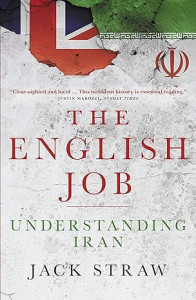 Straw, Jack: The English Job: Understanding Iran and why it distrusts Britain (Biteback, 2019), pp. 390, incl. index, ISBN 978-1-78590-399-1
Straw, Jack: The English Job: Understanding Iran and why it distrusts Britain (Biteback, 2019), pp. 390, incl. index, ISBN 978-1-78590-399-1
It was only by chance that I stumbled on this book, partly because from a marketing point of view the title is perfectly useless, and it’s hard to understand why the publisher agreed to it; it has all the hallmarks of an author’s choice. The trouble is that not only does the main title give no clue to the book’s subject but it sits uncomfortably with the use of the term in the book itself. Straw says that since Britain has so often in the past had a decisive hand in Iran’s domestic affairs, even a recent political upheaval can still be heard darkly described as ‘an English job’. (This is why it is a joke among diplomats, he tells us, that Iran is the only country that still regards Britain as a superpower.) However, use of the term with the definite article, ‘the English job’, does not catch this meaning.
The title notwithstanding, this is a valuable and well-crafted book. Straw, a former British Labour government foreign secretary, has immersed himself in Iran’s history and emerged a great admirer of its achievements and strong sympathiser with the way it has been preyed on by the Russians and the Americans as well as by the British. It is, nevertheless, the last with which he is mainly concerned and he records with regret the well-known string of interventions in Iran in the twentieth century prompted chiefly by Britain’s desire to protect its stronghold on the country’s oil industry via the Anglo-Iranian Oil Company (today British Petroleum) and its ‘outrageous, arrogant and ignorant’ leadership. This culminated in the role of the SIS station in the British Embassy in Tehran (together with the CIA) in the overthrow in 1953 of democratically elected prime minister, Mohammad Mossadegh, who nationalized the AIOC, and the elevation to a commanding position in government of the pro-Western shah, Mohammad Reza Pahlavi.
Straw, however, was no admirer of the Shah; nor is he an apologist for the Islamic Republic which demolished the Peacock Throne in 1979. Certainly, its diplomats and foreign ministry often receive high praise in this book. But ‘the deep state’ of the mullahs and their private army, the Islamic Revolutionary Guard Corps and its thugs, the Basij, which as well as much domestic nastiness specialise in thwarting the plans of the diplomats to achieve a profitable accommodation with the major powers, produce much understandable hand-wringing. Sometimes, too, he rightly points out, Iran’s rivals played into the hands of the deep state, notably by excluding it from major conferences on the Arab-Israeli conflict in the early 1990s and the Syrian civil war in 2012 and 2013, thereby provoking it to throw its support behind extremist groups such as Hamas, despite the latter’s support for Saddam in the Iran-Iraq War and Iran’s tacit alliance with Israel in the same conflict (p. 231). The consequences of this stupidity, to which I drew attention earlier, are only too obvious today (2023).
The author is also interesting on the response of the British and the Americans to the Shah’s requests for refuge and cancer treatment following his flight from Iran in January 1979. He was turned down by Mrs Thatcher’s government, Straw tells us, with implicit approval, because she feared this would jeopardise the safety of British Embassy staff in Tehran as well as trade with the country. But under pressure from Henry Kissinger, who was no doubt worried that refusal would send the wrong signal to other US deputy-sheriffs in unstable regions, his request was accepted by America’s ‘ever-vacillating’ president, Jimmy Carter, despite advice to the contrary from his own embassy in Tehran. The consequences of this stupidity in the occupation of the US Embassy for 444 days are also plain to see.
Among other episodes in Anglo-Iranian relations on which Jack Straw dwells with great authority is the shocking ransacking of the British Embassy’s two compounds in Tehran in 2011, which he describes vividly and with righteous anger (pp. 297-304). He only mentions in passing the peculiar British Interests Section in Tehran in the 1980s, concentrating here on the outrageous treatment of its head of chancery, Edward Chaplin and his family. But this passage aroused my interest and I did some digging around on it; the results can be seen here.
I found this book very useful and recommend it most warmly.


